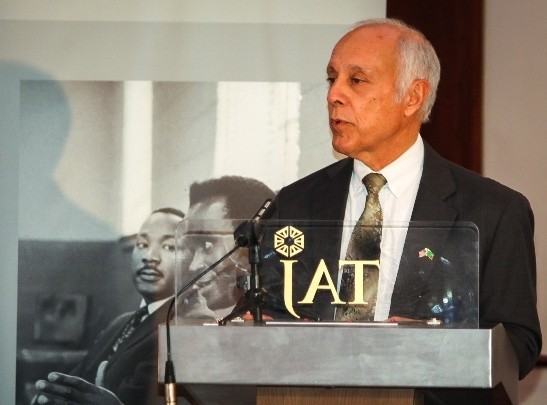
Officials of the Government of the Republic of Zambia;
Secretary Generals and representatives of the political parties present;
Executive Directors and representatives from civil society;
Staff of the National Democratic Institute, the Council of Churches in Zambia, the Zambia Young African Leaders Initiative, and Young Women in Action;
Representatives from the donor and NGO communities;
Distinguished invited guests, friends in the media, ladies and gentlemen;
And to all the Young Leaders present,
Good morning.
I am honored to be here today on behalf of the United States Government and pleased to bring you greetings from the United States Ambassador to Zambia, Mr. Eric Schultz.
I am delighted to join the National Democratic Institute and the young leaders who have gathered here in Lusaka for this Youth Political Conflict Mitigation Workshop. And we are indeed privileged to have with us today Mr. Johnny Mack, who leads Communities Without Boundaries, Dr. Keith Jennings of NDI, a long-time friend of the Zambian people and government, and of course Mr. Martin Luther King III.
The American and Zambian people share a long and deep friendship, working together over the years to strengthen Zambia’s national development, including through provision of critical health and education services. Zambia enjoys a tradition as a beacon of democracy in Africa, with more than two decades of successful multi-party democracy.
Nations, not just in Africa but around the world, have looked to Zambia as a role model. This is something that is enormously important for the Zambian people and government to protect and strengthen, including through efforts like this Conflict Mitigation Workshop.
While the challenges are many, as evidenced by the different events in both our countries over the past week, the opportunities are tremendous.
Your task today, and moving forward, is to work together across party lines and define ways to build on your nation’s important opportunities and overcome the challenges. Zambia’s democracy, indeed, any democracy, requires thoughtful, inclusive debate and informed participation.
A democracy needs engaged citizens, educating themselves and their communities on the basic issues; voting their choices; and then, regardless of the outcome, working with one another peacefully and actively to help move their country forward.
Such tasks are never easy, but they are ever more important. It is inspiring to see so many of you here – so many young people, committed to your parties, your institutions, and most importantly, to your country. It is inspiring to see your commitment to the principle of peaceful, productive political participation as a positive means of advancing Zambia’s national development.
To quote Nelson Mandela, “I pay tribute to the endless heroism of youth. I appeal to the youth, … start talking to each other across divisions of race and political organizations.”
This is what you are here to do today, to talk to each other across political lines about peaceful, productive political engagement, about how to move your country forward.
Almost all of the progress experienced within society throughout history has come about with the involvement of young people and I can think of no better person to join with you today than our special guest. I have the sincere honor of introducing, Mr. Martin Luther King III.
Martin Luther King, III, the second oldest child of Rev. Dr. Martin Luther King, Jr. and Coretta Scott King, has motivated audiences around the world with his insightful message of hope and civility for nearly twenty years. He has taken up the torch lit by his father and continued the quest for equality and justice for all people.
From Mozambique to Mississippi, Israel to Indiana, and now, to Zambia - his message has touched countless thousands. As the Mission Director for USAID/Zambia and the Chargé d’Affaires for the U.S. Embassy in Lusaka, it is my sincere honor and distinct privilege to introduce Mr. Martin Luther King III.







Comment
Make a general inquiry or suggest an improvement.